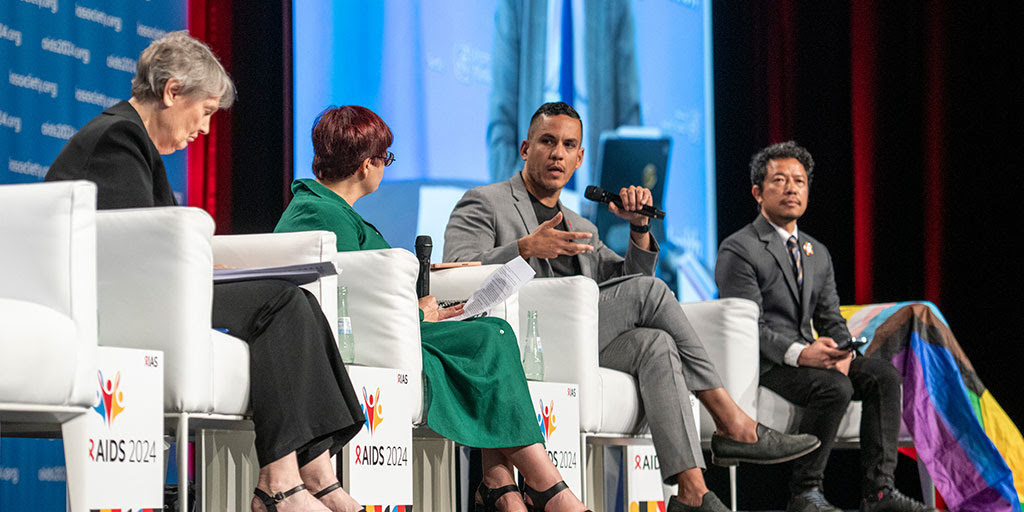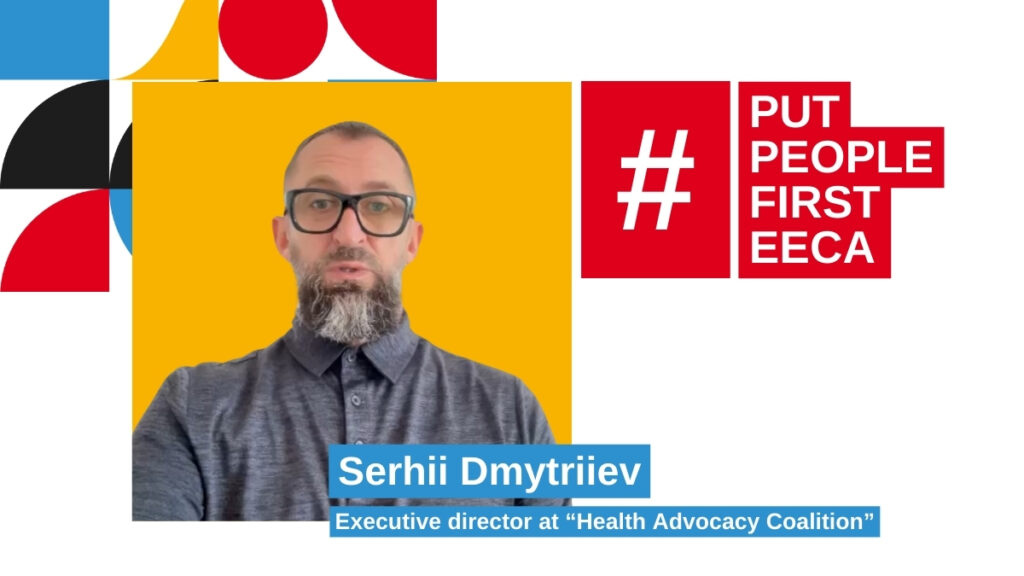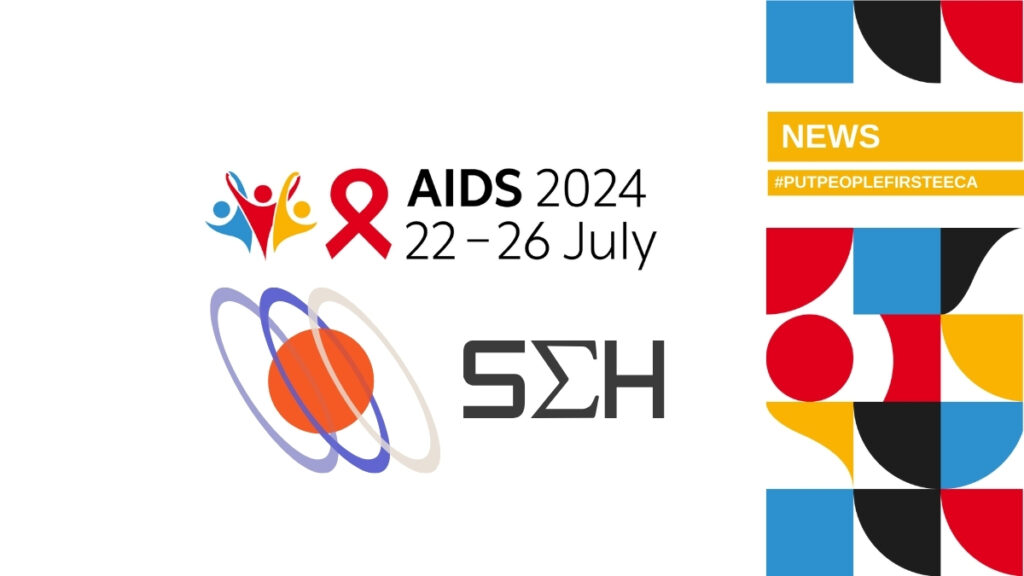Guten Morgen! We had a packed day yesterday with AIDS 2024 well and truly underway, including a special session on the strategies needed to overcome inequities.
You can hear from former New Zealand Prime Minister Helen Clark again today as she speaks during a plenary on addressing structural barriers. We also have groundbreaking science being shared – including news of the “next Berlin patient” – as well as the presentation of a host of IAS-supported prizes and awards.
Coming up today
Convert to your time zone through the AIDS 2024 programme.
07:00 CEST
Satellite sessions get underway.
08:30 CEST
Former New Zealand Prime Minister Helen Clark speaks on health as “a matter of global politics” at the plenary, “Addressing structural barriers: How can we do better?”. The session closes with the presenting of the Elizabeth Taylor Human Rights Award, supported by the IAS and Foundation for AIDS Research (amfAR).
10:00 CEST
Workshops explore successful rollout and access to multipurpose prevention technologies and empowering communities and challenging patents.
10:30 CEST
The AIDS 2024 Co-Chairs’ Choice special session features a presentation on the “next Berlin patient”, who sustained HIV remission for more than five years without antiretroviral therapy after a heterozygous CCR5 WT/Δ32 allogeneic hematopoietic stem cell transplant. Updated data will also be shared from the PURPOSE 1 Study on twice-yearly Lenacapavir or daily Emtricitabine/Tenofovir Alafenamide for HIV prevention in cisgender women. The session concludes with the awarding of the IAS President’s Award.
Explore the latest in prevention. “The quest for HIV vaccines” presents an abstract with results of an eight-year follow up of the Phase 2 clinical trials of the HIV-1 Tat-based therapeutic vaccine to intensify or replace ART. “Welcome to the prevention choice agenda!” includes results from the Pharm PrEP study in Kenya and the SEARCH Dynamic Choice HIV prevention trial on long-acting cabotegravir. A symposium unpacks the power of U=U in HIV prevention and treatment.
Oral abstract sessions present successes in harm reduction in challenging settings, look at the HIV response during political instability and emergencies, and point out opportunities and vulnerabilities in the digital age.

12:00 CEST
Workshops focus on the updated British HIV Association Guidelines on Immunisations for Adults Living with HIV and harnessing the power of social media for advocacy.
Satellite sessions also take place. Among these is “HIV today and tomorrow: The evolving importance of choice”, organized by MSD.
13:30 CEST
Nobel Prize laureate and former IAS President Françoise Barré-Sinoussi is part of a panel at the special session, “HIV science for the future”, which explores global research collaborations, with insights into lessons from the HIV pandemic and their relevance for other pandemics. It concludes with the awarding of the IAS/ANRS Lange/van Tongeren Prizes for Young Investigators.
14:30 CEST
Workshops explore good laws in getting decriminalization right and decolonizing HIV funding, building on a global, community-led call for a paradigm shift in how funds are distributed and received.
15:00 CEST
You won’t want to miss “Reinvigorating parliamentary leadership in HIV”. Over 370 Members of Parliament from over 45 countries unite to put people first in rebuilding political support for ending HIV transmissions as part of the Global Parliamentary Platform on HIV and AIDS founding declaration. Today’s event features MPs from Argentina, Germany, United Kingdom and Zimbabwe and addresses the waning political commitment to the HIV response.
The IAS Me and My Healthcare Provider Campaign, supported by Gilead, recognizes frontline healthcare workers who deliver quality HIV services to key populations, often in the face of stigma and discrimination. Twenty Me and My Healthcare Provider Campaign Champions for 2024 from five countries are recognized in this symposium on the impact of stigma and discrimination in the civic space.
Second-generation integrase strand transfer inhibitors (INSTIs) are first-line in all global and many national guidelines. The oral abstract session, “What if one-size INSTI doesn’t fit all?”, describes the impact of a one-size-fits-all strategy on national programmes, discusses access to alternative agents, and offers a clinical perspective on applying WHO guidelines to practice when access to monitoring is limited.
Several sessions focus on keeping key populations at the centre:
- The oral abstract session, “Catalysts of change: Key population-led innovations”, showcases empowering sex workers in HIV prevention in Europe, Australia’s community-led HIV Treatment for All campaign, and more. “Meeting people where they are: Interventions to support testing” offers examples from people in prisons, young men, and women who exchange sex and use substances in Bangladesh, India, Kazakhstan and Uganda.
- Symposia focus on design and implementation of person-centred services for key populations and optimizing the power of communities in the HIV response.

16:30 CEST
The symposium, “Migration, mobile populations and HIV”, explores challenges in accessing HIV prevention and care services introduced by migration, mobility and displacement across locations and key populations. The oral abstract session, “Navigating adversities: HIV response in conflict zones and migration pathways”, presents examples of interventions from Central America, Ukraine and Uganda.
The oral abstract session, “TB or not TB?” updates on treatment for TB among people living with HIV. Explore a “tale of two diseases”, TB and hepatitis, with a focus on community-led monitoring and integrating self-testing into HIV and harm reduction services.
More options:
- A symposium presents recent advances in the understanding of determinants shaping HIV transmission, the journey of the virus inside the cell, disease progression and viral rebound.
- Communities take centre stage in an oral abstract session on overcoming prevention challenges through peer-led interventions.
- A symposium on inter-generational dialogues creates a space where older and younger participants can share perspectives, challenges and insights.
17:00 CEST
The Robert Carr Research Award and Memorial Lecture takes place in the Global Village, with a community-academia partnership team receiving the award and presenting its research.
18:00 CEST
Satellite sessions take place.
Yesterday
23 July recap

DoxyPrEP: Yes, you read that correctly! We’ve known about doxycycline post-exposure prophylaxis (DoxyPEP) for some time. Now we have doxycycline post-exposure prophylaxis (DoxyPrEP) – taking the antibiotic before sex. Authors of two small studies from opposite sides of the world presented findings yesterday.
A trial from Canada involving men who have sex with men, living with HIV and with a history of syphilis, showed reductions of 79% in syphilis, 92% in chlamydia and 68% in gonorrhoea in the doxycycline arm compared with the placebo arm.
A study from Japan among female sex workers showed a drop in STI incidence from 232.3 to 79.2 per 100 person-years. Syphilis incidence was zero and chlamydia incidence reduced significantly. According to the study team, the findings support introduction of DoxyPrEP in populations that are highly vulnerable to STIs.
DoxyPEP: STI rates among young women using PrEP in central, eastern, southern and western Africa are high. Trials here show that DoxyPEP effectively prevents STIs among cisgender men and trans women but not cisgender women because use of DoxyPEP is low, with barriers such as side effects, pill burden, stigma and fear of partner reaction. A study on DoxyPEP adherence among young women in Kenya showed that adherence could be better supported by decreasing frequency and urgency dosing to allow for optimal location and timing of dosing.
Reaching the targets: The odds of people living with HIV knowing their HIV status increases by a factor of almost 2 in countries that have adopted civil society freedom policies. A legal and policy review for 194 countries from 2017 to 2023 concluded that legislation and freedom policies for civil society have an impact on national ability to reach AIDS targets. “The adoption of national laws supporting both CSO [civil society organization] operational freedom and social contracting should be a priority for the global AIDS response,” the researchers say.
Preparing for the next pandemic: How can lessons from COVID-19 and HIV inform preparedness for “Disease X”, a theoretical future pandemic? A grey literature review on the HIV and SARS-CoV-2 responses identified tactics used by civil society, governments and global actors that could be pivotal in Disease X response. Many lessons from HIV were not taken up in COVID-19 and must be in future pandemics, the researchers concluded. Foremost is addressing inequality, using a global public goods approach and mobilizing communities, with policies and programmes improving vulnerable people’s social and economic conditions.
Towards equity: Inequity still drives the HIV pandemic and is a great barrier to ending HIV as a public health threat. The special session, “Inequities forever?”, emphasized the need for global, regional and national strategies that go beyond public health interventions to address structural inequalities. The symposium, “Equity in focus: Tackling inequalities”, dissected such challenges as criminalization of key populations; medical torture, loss of dignity and forced testing; gender inequality; and access to testing and treatment. It also highlighted the vital role of community-led organizations in addressing challenges.
Health and human rights: Members of the International AIDS Society–Lancet Commission on Health and Human Rights shared findings and recommendations. The commission described the COVID-19 pandemic as “a failed test case for the world’s commitment to international solidarity, equity, and human rights” and climate change as “already having severe health and economic consequences in the communities and societies least responsible for it”. Find its full report here.
Global Village

Here are some picks around the theme of healthcare and treatment:
- “SExT: Sex Education by Theatre” is an award-winning, trauma-informed peer education programme from Canada. It makes its international debut in the Global Village at 14:00 CEST!
- “The face of care” showcases the experiences and challenges of frontline providers in the paediatric-adolescent HIV response on the African continent.
- “Into chems?” is an open space to talk about chemsex and other sexualized psychoactive substance use practices and coordinated local, regional and global responses.
- This workshop at 11:00 CEST shares approaches, resources and learning from the UK Fast-Track Cities, London and Bristol, for reducing internalized stigma for people living with HIV and educating healthcare providers about HIV to reduce stigma in healthcare settings.
- More broadly, share your thoughts on restoring political momentum towards ending the HIV pandemic. At 16:30 CEST, join the dialogue between communities, civil society and parliamentarians at the GFAN and APH Ukraine Networking Zone.
HIV unmuted

Listen to the latest episode of HIV unmuted, the award-winning IAS podcast, on the game-changing research from AIDS 2024, the 25th International AIDS Conference. Sharon Lewin, the IAS President and AIDS 2024 International Co-Chair, sits down with our new host, Juan Michael Porter II. They delve into a broad range of exciting science, from long-acting injectables to new research on doxycycline prophylaxis to advances in cure research, including the “next Berlin Patient”.
Rapporteur summaries
The rapporteur summaries are your go-to resources for the highlights presented at AIDS 2024. Thanks to the AIDS 2024 team of experts, delegates can access daily recaps by each programme track here.
Poster exhibition

Among posters on display today are:
- The Pilot SMART trial of motivational enhancement interventions to increase PrEP use in sexual minority men
- Advancing human rights to break the cycle of violence against people who inject drugs and trans people in the DRC
- Host metabolites that modulate the efficacy of romidepsin in reactivating latent HIV
- A look at “myHIV forum” and the importance of an online platform for people living with HIV
- How an integrated HIV/HTN care model improves individual-level blood pressure reduction among adults with HIV in Uganda
- Insights into psychosocial influences on men who have sex with men and their use of PrEP
JIAS supplement just launched

Just published! Read all oral abstracts from AIDS 2024 in the new Journal of the International AIDS Society abstract supplement.

AIDS 2024 Live Show
Tune in to the AIDS 2024 Live Show at 08:30 CEST daily to learn about conference developments and what lies ahead. Host Karl Schmid will be live from the Global Village and joined by leading voices in the HIV response. Today’s scheduled guests include:
- Glory Alexander, ASHA Foundation
- Rahul Kumawat, Positive YUVA Network
- Joyce Ouma, Y+ Global



